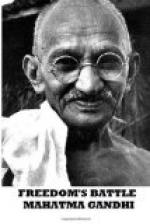At the present moment, however, the duty of those who approve my activity is clear. They ought on no account to resent the deprivation of my liberty, should the Government of India deem it to be their duty to take it away. A citizen has no right to resist such restriction imposed in accordance with the laws of the State to which he belongs. Much less have those who sympathise with him. In my case there can be no question of sympathy. For I deliberately oppose the Government to the extent of trying to put its very existence in jeopardy. For my supporters, therefore, it must be a moment of joy when I am imprisoned. It means the beginning of success if only the supporters continue the policy for which I stand. If the Government arrest me, they would do so in order to stop the progress of Non-co-operation which I preach. It follows that if Non-co-operation continues with unabated vigour, even after my arrest, the Government must imprison others or grant the people’s wish in order to gain their co-operation. Any eruption of violence on the part of the people even under provocation would end in disaster. Whether therefore it is I or any one else who is arrested during the campaign, the first condition of success is that there must be no resentment shown against it. We cannot imperil the very existence of a Government and quarrel with its attempt to save itself by punishing those who place it in danger.
HIJARAT AND ITS MEANING
India is a continent. Its articulate thousands know what its inarticulate millions are doing or thinking. The Government and the educated Indians may think that the Khilafat movement is merely a passing phase. The millions of Mussalmans think otherwise. The flight of the Mussalmans is growing apace. The newspapers contain paragraphs in out of the way corners informing the readers that a special train containing a barrister with sixty women, forty children including twenty sucklings, all told 765, have left for Afghanistan. They were cheered en route. They were presented with cash, edibles and other things, and were joined by more Muhajarins on the way. No fanatical preaching by Shaukatali can make people break up and leave their homes for an unknown land. There must be an abiding faith in them. That it is better for them to leave a State which has no regard for their religious sentiment and face a beggar’s life than to remain in it even though it may be in a princely manner. Nothing but pride of power can blind the Government of India to the scene that is being enacted before it.
But there is yet another side to the movement. Here are the facts as stated in the following Government Communique dated 10th July 1920:—




